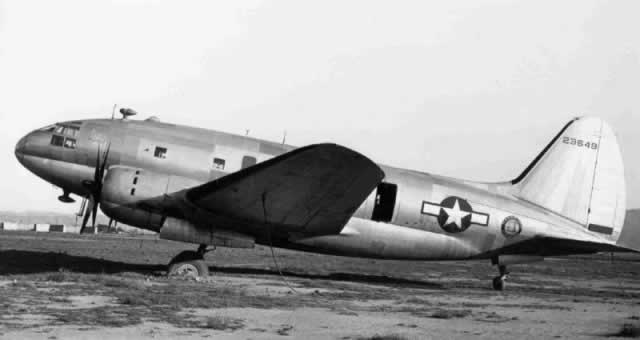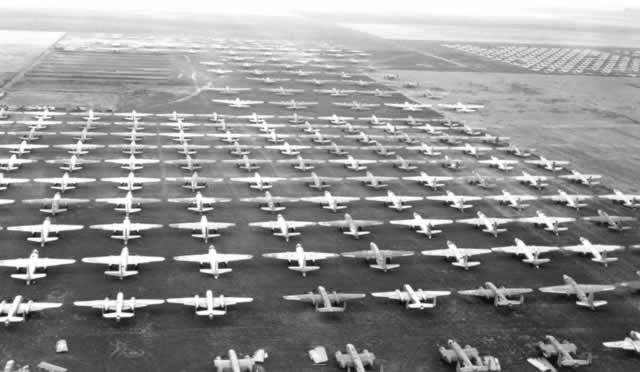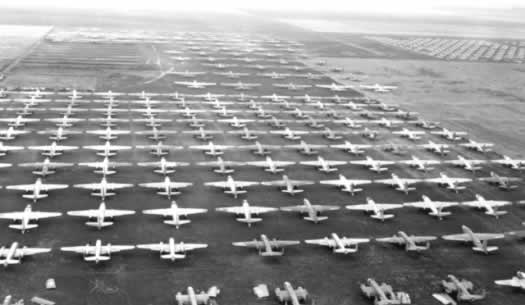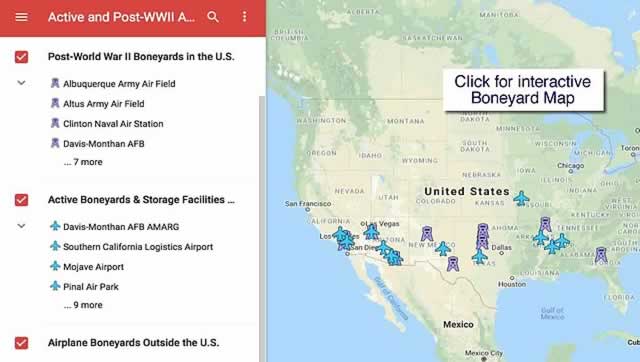
Ontario Aircraft Boneyard at Cal-Aero Airfield After WWII
Within a year of the signing of peace treaties, about 34,000 airplanes had been moved to 30 locations within the U.S. The War Assets Administration (WAA) and the Reconstruction Finance Corporation (RFC) handled the disposal of these aircraft.
The RFC established depots around the country to store and sell surplus aircraft. By the summer of 1945, at least 30 sales-storage depots and 23 sales centers were in operation.
Brief History of Cal-Aero Field
Cal-Aero Academy was a civilian aviation school, established before World War II, and later contracted by the AAF to train pilots. While working with the Army, the school trained Army Air Cadets to fly Stearmans and BT-13s. The Cal-Aero Academy was closed on October 16, 1944, after training 10,365 fighter and bomber pilots for the war effort.
Cal-Aero Field was located east of Los Angeles, near Chino and Ontario, California.
Cal-Aero Becomes a Military Aircraft Boneyard After WWII
After the war, the Reconstruction Finance Corporation (RFC) established a sales depot at the inactive Cal-Aero Field, although it was referred to by the RFC as "Ontario".
The large agricultural area around the airfield was an excellent storage location for surplus military aircraft.
Nearly 1,900 aircraft would be transferred to Cal-Aero, of which about 500 were sold and the rest dismantled.
Aerial view of surplus military planes in storage at Cal-Aero Field in California after WWII (Photo used by permission of the photographer, William T. Larkins) |
Among the aircraft types sent to Cal-Aero were the following:
- Curtiss C-46 Commando
- Boeing B-17 Flying Fortress
- B-24 Liberator
- B-25 Mitchell
- P-51 Mustang
- C-47 Skytrain
- P-40 Warhawk
- P-38 Lightning
- and other aircraft
One smelter was operated by the Sharp & Fellows Contracting company to melt the aircraft parts from Cal-Aero, offsite at Norco, CA.
Many C-46 Commandos were sent to Cal-Aero Field (see photo to the right) for storage, sale and disposal.
 Curtiss C-46A Commando, S/N 42-3649, for sale at Cal-Aero Field, California, post-WWII (Photo used by permission of the photographer, William T. Larkins) |
In later years the C-46 went back to war, serving in both the Korea and Vietnam conflicts for various U.S. Air Force operations, including resupply missions, paratroop drops, and clandestine agent transportation.
Chino Airport Today
Beginning in the early 1970s, the airport became the center of the warbird restoration movement in Southern California. Cal-Aero Field today is known as Chino Airport. It has become the airport of choice for many independent pilots, students and trainers, and corporate users. It's business-friendly atmosphere has created a haven for entrepreneurs and corporate ventures.
Chino Airport (CNO) is classified as a general aviation reliever airport, due to its close proximity to Ontario International Airport.
Aerial View of Cal-Aero Post-World War II
Aerial view of surplus military aircraft in storage at Cal-Aero Field, California after WWII (Photo used by permission of the photographer, William T. Larkins) |
 |
Map of locations of active and post-WWII airplane boneyards and plane storage facilities in the United States
Interactive Map of Chino Airport Area in Southern California

